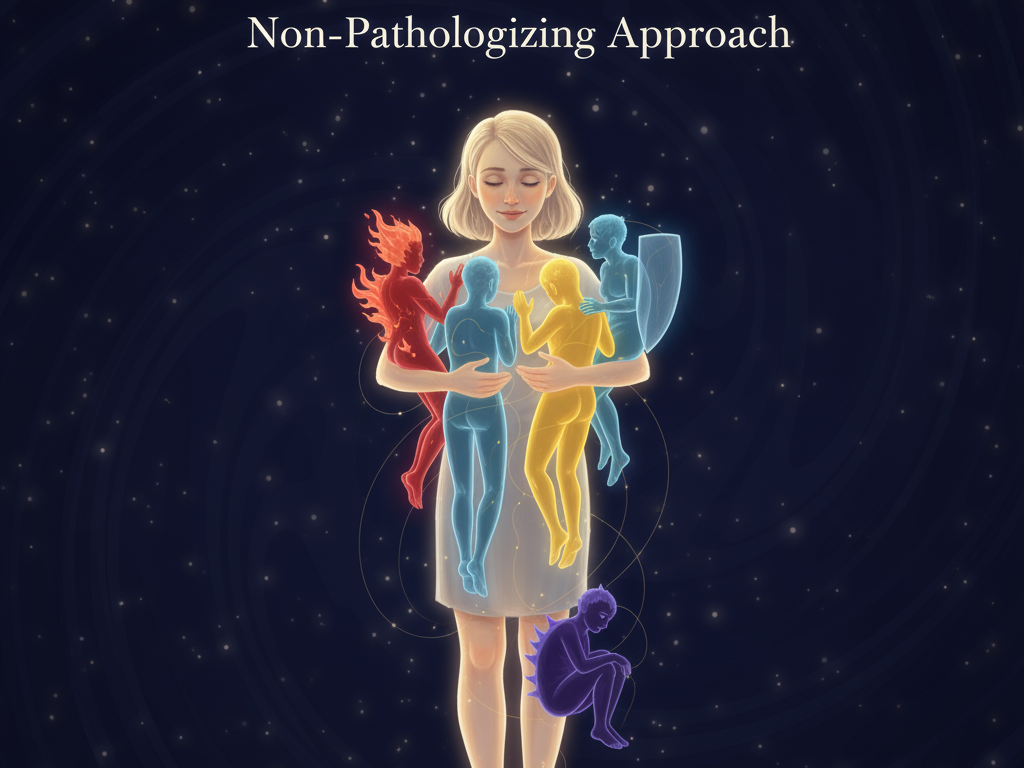IFS Skills to Address Post-Traumatic Shame
September 29, 2025 | by Steven Johnson

Post-traumatic shame is one of the most painful emotions survivors faces. Unlike guilt, which focuses on behavior, shame latches onto identity, telling individuals that they are somehow broken or unworthy. This deep-seated emotion often becomes a hidden barrier to healing. Internal Family Systems (IFS) therapy offers a compassionate framework to work with shame in a transformative way, helping survivors reclaim a sense of wholeness and inner safety.
Make Shame Sayable
Change “I am ashamed” to “a part of me feels shame,” and notice how room returns to the body. This one shift unblends identity from emotion, turning a verdict into a conversation.
Meet the Inner Team
Managers try to prevent shame by perfecting, pleasing, and staying in control; Firefighters rush in when shame spikes, numbing or distracting fast. Beneath them are Exiles carrying the oldest stories—“I’m unlovable,” “It was my fault”—waiting to be witnessed by Self, not silenced by force.
A Short IFS Ritual
Pause, name the part, and find it in the body. Ask what it’s afraid would happen if it didn’t do its job. Appreciate its intention, even if the method hurts. If there’s space, ask protectors for permission to meet the Exile; go only as slow as trust allows.

When an Exile is fully seen—age, image, meaning—something loosens. Offer what was missing then: protection, truth, and care. Let the part choose a release—light, wind, water, or fire—and watch the system reorganize as protectors retire old roles.
There are no bad parts—only outdated strategies longing for leadership. IFS doesn’t fight shame; it befriends the protectors that carry it, and in that warmth, the nervous system learns safety from the inside out.
Creative Sparks
Write a three‑line thank‑you note to the inner critic and invite it to rest. Give shame a color and texture, then imagine rinsing it until it changes. Build a playlist for each part and notice how the music shifts when Self leads.
Signs You’re Healing

Language softens from certainty to curiosity. Urges to perfect or numb ask for consent instead of taking over. Old beliefs lose weight, and recovery after triggers comes faster, like a tide that returns without flooding.
Shame after trauma feels like wet paint on the soul—everything it touches seems stained—but it’s not identity, it’s a burden carried by protective parts that once kept danger at bay. Internal Family Systems (IFS) helps meet those parts with calm, curious Self‑energy so they can soften, speak, and eventually set down what they’ve held for too long.
Understanding Post-Traumatic Shame
Trauma can fracture the way people see themselves. Survivors might carry burdens of self-blame, silence, or secrecy. Shame thrives in this silence, creating inner voices that say, “It was my fault” or “I don’t deserve to heal.” These beliefs often feel absolute, making it difficult to connect with others or even with oneself.

IFS therapy views the mind as a system of parts that each serve a protective role, even if their strategies cause distress. Shame-based parts often developed as protectors to keep the survivor safe, hidden, or in control in the face of overwhelming experiences. Instead of pathologizing these parts, IFS encourages curiosity and compassion toward them.
Key IFS principles for addressing shame include:
- Every part has a positive intent, even if its method causes pain.
- The core Self—calm, curious, and compassionate—remains intact despite trauma.
- Healing comes from unburdening parts that carry extreme roles or traumatic memories.
Practical IFS Skills for Working with Shame

1. Befriending Exiled Parts
Exiles are parts of the self that carry the pain of early experiences, often loaded with shame. Instead of pushing them away, survivors learn to gently approach them with compassion. By listening rather than avoiding, shame begins to loosen its grip.
2. Developing a Curious Witness
IFS encourages survivors to step into Self—the inner state of presence marked by calmness and clarity. From here, they can witness shame without becoming overwhelmed by it. This shift helps survivors see shame as a burden carried by a part, not as their true identity.
3. Unblending from Shame-Based Voices
Shameful thoughts often sound absolute: “I am unworthy.” With IFS skills, individuals learn to separate from these statements. By saying, “A part of me feels unworthy,” survivors acknowledge the experience without fusing their entire identity to it.
4. Unburdening the Past
Shame often acts as armor carried since childhood. Through IFS, these parts can release their burdens—beliefs or emotions they took on during traumatic events. Once released, the part reclaims its natural state of confidence, creativity, and connection.
5. Building Compassionate Self-Leadership
Healing shame requires a consistent return to Self-leadership. By cultivating compassion, gentleness, and patience, survivors gradually build trust within their system. Over time, this leadership reduces shame’s intensity and supports lasting transformation.
Why IFS is Effective for Shame Healing

Unlike approaches that aim to suppress or challenge shame directly, IFS recognizes the wisdom hidden in each part. This respectful stance reduces inner conflict and helps survivors access deeper resilience. As shame parts are heard and unburdened, survivors often report feeling lighter, freer, and more authentic in relationships.
Final Thoughts
Post-traumatic shame can feel like an invisible cage, but it is not permanent. IFS offers a roadmap to approach shame not as an enemy but as a messenger, guiding survivors back toward compassion and wholeness. By listening to these parts with patience, survivors can release the burdens of silence and finally step into a fuller sense of self.
RELATED POSTS
View all



